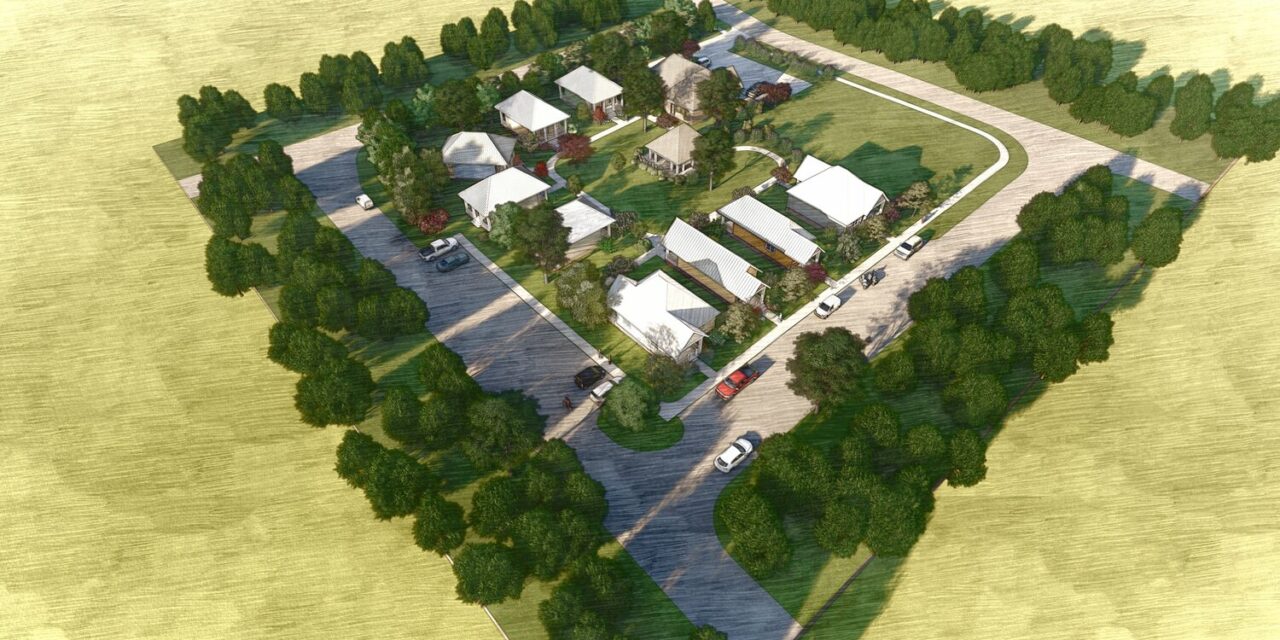Harold Copenhaver and Harold Perrin hold a lot in common. Besides sharing the same first name, both men have spent decades living and working in Jonesboro, Arkansas. Both have a long history of civic involvement and both ran for and were elected mayor of the Northeast Arkansas city. In fact, their respective administrations fell back-to-back, Perrin from 2009 to 2020 and Copenhaver taking the reins after that.
But of all the things they hold in common, arguably none is more impactful than Veterans Village, a public-private development to provide dignified housing and facilitate services for homeless veterans.
“My father was an Air Force veteran of 24 years. I, myself, was born at the Air Force Academy,” Copenhaver said. “Veterans are the foundation to why we have the freedoms to do what we’re doing now.”
“We’re giving back to these guys and ladies who served in any branch of the military,” Perrin said. “We owe it to them to give them a nice place to live.”
The issue of homelessness in general, and of vets in particular, has become an increasingly thorny one in Jonesboro. The city, population nearly 80,000, doesn’t even have a homeless shelter. Veterans’ services took a step forward with the opening of the Beck PRIDE Center at Arkansas State University, an office that provides combat-wounded veterans with various educational programs and services.
Inspired by this model, ideas for transitional housing to dovetail with Beck PRIDE’s programs began to take shape under Perrin’s administration.
“[Beck PRIDE’s] programs screen the veterans to find out what their needs are, whether it be medical, education, employment, etc.,” said Perrin, now an executive with First Security Bank. “One of the big shortages was transitional housing for our veterans. I started doing research and we looked around at other cities and states on how they’re handling that.
“The majority of them were going into places and trying to rehab some homes and fix them up and let the veterans live there. My thought was, let’s see if there is money out there that we can build little homes because these veterans definitely have some issues and we want them to feel that it’s really a community, built like a home.”
Placement of Veterans Village was key, as city leaders and veterans advocates agreed proximity to the Beck PRIDE services was a priority. City officials identified a roughly 1-acre plat of derelict structures that was in the city’s land bank that fit the bill.
“Once homes get to a certain standard or individuals have let them go, the city will then purchase those areas. This site was basically old homes, previously. We tore that down and thus made it vacant property,” Copenhaver said. “We wanted to provide services between here and the university, making it more user-friendly. Obviously, this footprint fit the area perfectly.”
Veterans Village comprises nine homes, completed at a cost of around $1.4 million. Seven of the units are single-bedroom, each 550 square feet, and two are two-bedroom units, each around 900 square feet. The criteria for becoming a tenant is tied to income and the person’s status as a homeless veteran.
Officials expect the first tenants to move into the transitional housing development by the end of June, at which time tenants can address the next steps in their march toward independence. Achieving this outcome, Perrin said, was the rationale behind building a neighborhood-style development.
“When we started a land bank here, the city can buy homes or homes could be given to them for taxes and things of that nature, which the city could’ve fixed up for this use,” he said. “The problem with that is, they’re scattered all over that city, so [veterans] don’t have that camaraderie.
“We wanted to tie it into a village concept where the sidewalks go around to all the houses, they can get to know their neighbors and they have a common theme in the fact that they’re all veterans. It’s the kind of place that you can share your feelings with folks who have been where they are and maybe have the same issues.”
The neighborhood concept is anchored by a 1,500-square-foot activities center, said Regina Burkett, director of Community Development and Grants.
“The activity center will have office space and common areas,” she said. “There will be services located in that center and [veterans] will also be bussed from there to other places for mental health services, to see social workers or any kind of case where assistance is needed.”
“We’re going to be able to provide an avenue for people to come and directly communicate with the veterans who are here,” Copenhaver said. “Even if they are not housed here, the services are going to be open to our local veterans. Frankly, they often just don’t know where to go or they’re too embarrassed to ask. We’re building the awareness for the veterans that, hey, you do have options out there, through all of these other services.”
The development is a joint venture between the city, ASU and Beck PRIDE Center. Grants, donations and public-private partnerships have raised around $2 million so far, from donors large and small. Businesses have also kicked in with various in-kind donations, from furnishings to linens to laundry service.
“I’ve always said public-private partnerships work,” Perrin said. “We’ve got the public involved as well as the city and, in this case, Beck PRIDE and Arkansas State University. Every time I turned around, someone was blessing the city, saying, ‘I will do this. I will donate this.’
“That’s really the way you have to do these things; no one agency is going to be able to give you enough money to do a project. You’re going to have to use the city or the county or whoever the agency is that kicks it off, then go out and work with private industry as well as other people to get things done. This was a win-win from the very beginning; it was just how do you put it together.”
Even with the community’s outpouring, rising construction and materials prices last year had the project running at a deficit by the time Copenhaver took office. A former state legislator, he reached out to the Arkansas State Attorney General’s office for help.
“Having previously served in the legislature, I knew the attorney general has a slush fund available that goes back to low- to moderate-income communities,” he said. “I contacted Attorney General Leslie Rutledge and she was more than open to the project, contributing $250,000 in late January.”
Both Perrin and Copenhaver noted with pride that Veterans Village is the first of its kind in the state, which has other Arkansas communities calling for advice on how to get something similar started. Copenhaver said he is happy to oblige, while at the same time saying there’s still much to learn to effectively address Jonesboro’s homeless going forward.
“I think the bottom line is, we’re learning from this and what we can do here and how we can advance it throughout our community, to provide for other homeless individuals that are not veterans,” he said. “This is just one step.”



